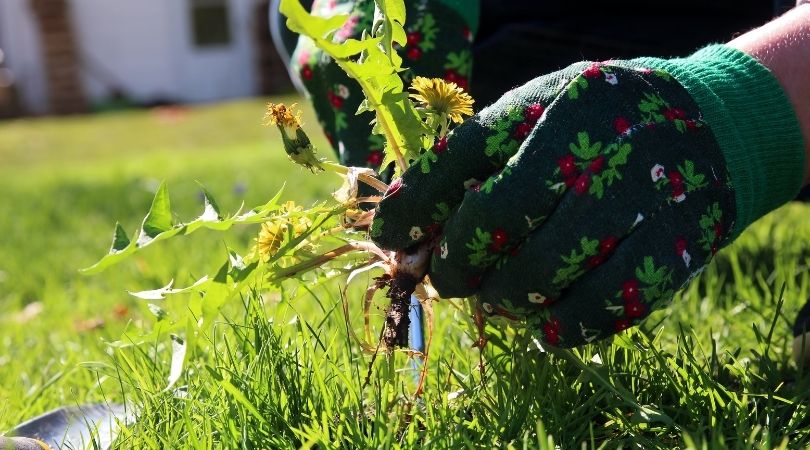We’ve all been there. These hostile plants seem to spring up in the dead of night and then set about smothering your flower beds and beautifully manicured lawn. Makes me want to pull my hair out. So, I set out to find out how to get rid of weeds without killing grass.
And I was pleasantly surprised at the variety of tools and concoctions the average gardener can use to achieve just this! Most of them are fun to mix and try out, and one is even fun to drink. You’ll know the one I mean when you get to that part of the article.
And, just for the hell of it, I thought I’d focus on natural ways, instead of making a bad situation worse by using all kinds of ominous chemical compounds. I’m quick to add – I’m not against well-researched weed control products, and I’ll be covering those too. But for those of us who have watched our fingers turn green over the years, natural is still the way to go.
All it will take is a small adjustment in your gardening techniques, and before you know it, you’ll have solved your weed problem. And, guaranteed, you’ll be having fun in the process.
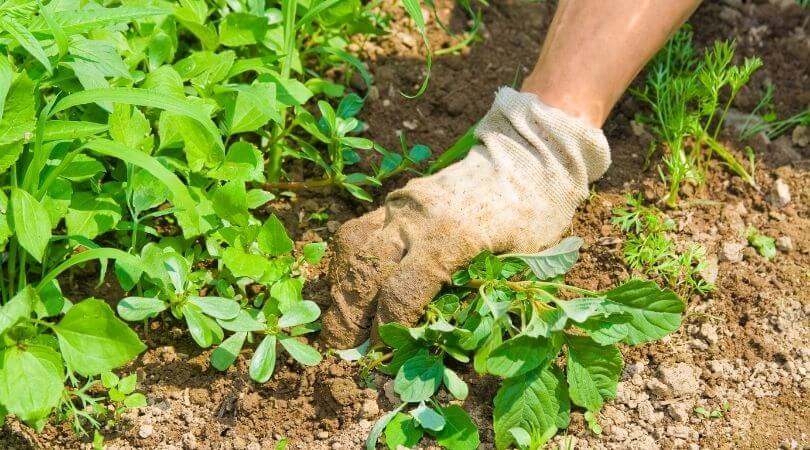
The most common weeds we encounter
- Chickweed
- Purslane
- Ground Ivy
- Dandelions
- Crabgrass
- Stinging Nettle
- Common Ragweed
I’m pretty sure some of these are familiar. And it helps to know what you’re looking for when you go weed hunting!
How to get rid of these pests
1. Simply pull them out
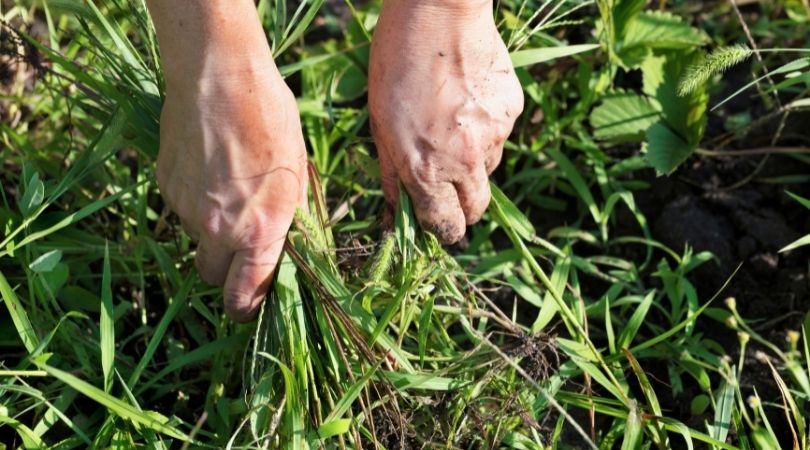
I know. This one is obvious. And it’s the one you least want to do! Me Too.
But it’s one of the safest ways to get rid of the weeds in your grass, even if it takes time. Make sure you have a small trowel handy so you can dig out the invaders, roots and all.
2. Plant good ground cover
This is one of the frequently overlooked ways to control the spread of weeds – planting good ground cover.
A ground cover will rob the weed plant of soil space and sunlight, and their spreading root systems make it difficult for the weeds to gain a foothold.
3. Make a safe weed killer yourself
Here’s a recipe – and there are a couple more to follow later on in the article.
Corn gluten meal is a byproduct of the process of milling corn. If you apply this on and around affected areas, your weed problem may well be something of the past.
Corn gluten meal frustrates the weeds’ germination cycle. And where there’s no germination, there’re no adult plants!
Best of all – it won’t kill your grass.
4. White vinegar
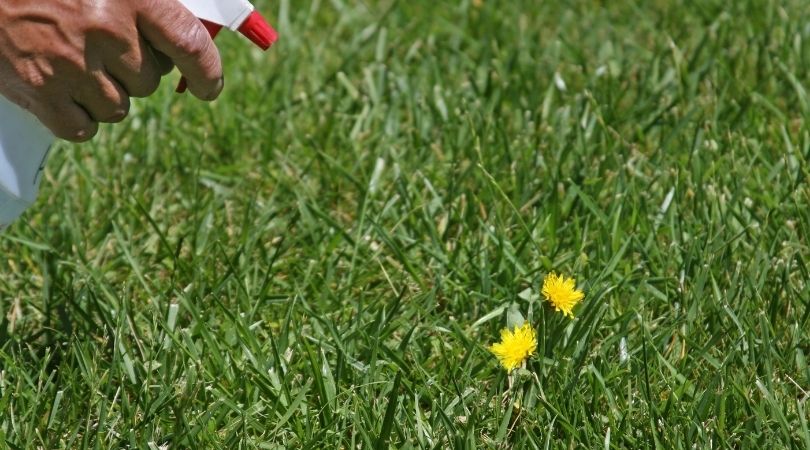
So much is said about using vinegar to kill weeds – and that it won’t harm your grass. Personally, I believe the jury’s still out on that one. But it can work if you do it right.
If you use this as a weed killer, it’s best to spray it on the weed itself.
One of the best ways to prevent harm to surrounding plants and your grass is to spray the vinegar on a sponge or cloth, and then apply it to the weed.
More than one application may be necessary to kill more stubborn weeds.
5. Simply don’t mow your lawn real low
Nothing invites a weed like a bare spot. Opportunists, this plant-vermin, I tell you!
We all loved a well-shaved lawn. But adjusting your cutting height up a little will allow the grass to absorb more sunlight.
Your grass’ roots will grow deeper, you’ll see fewer bare patches, and the weeds will move to your neighbor’s yard.
Problem solved. For you at least …
6. Salt, believe it or not
Salt works great, but be careful around your grass, like with vinegar.
Combine the salt with dishwashing liquid or even white vinegar.
Here’s the recipe:
- One gallon of white vinegar
- A cup of salt
- One tablespoon of dishwashing liquid
Mix in a large bucket. Fill up a spray bottle, and go to war!
Remember, target the weeds directly. Even spray on areas you think the weeds may spring up soon.
7. Offer them a drink
If the weeds are growing in areas where the lighting is good you can try (drumroll, please) Vodka!
It dries out the plants. Add a few drops of dishwashing liquid to make it easier for the Vodka to adhere to the plant, spray, and allow nature to do the rest.
The Vodka breaks down the thin layer of protective wax on the leaves of the plan, making it wither and burn in the sun.
Here’s the recipe (and no, there’s no tonic in it!)
- One liquid ounce of Vodka
- 2 cups of water
- 5 drops of dishwashing liquid
8. Mulch blocks the weeds
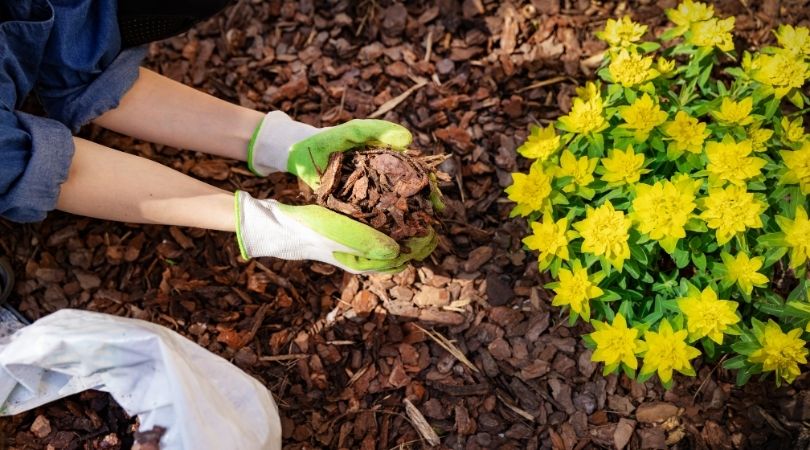
Apply plenty of mulch around your flowers. Yes, you ask, but what about my grass? Don’t worry, I got you.
It’s already easy for the weeds to grow in your flower beds. So that’s where they’ll probably attack first.
From there they’ll hop onto your lawn. Yes, it’s tougher for them to grow there, but it’s also tougher for you to control them on your lawn.
Stop them at the flowerbed, and your lawn will be safer. Guaranteed.
9. Commercial weed killer
Told you I was going to touch on these! The great thing about these is that they can target specific plant species while being completely harmless to others. That’s the beauty of chemistry.
The active ingredient in these pesticides is usually Glyphosate.
But stay awake when you use them. The bottle may say it’s harmless to other plants, but personal experience has taught me that’s not always the case. Especially in the case of grass.
10. Watch how you water
We’ve always been taught that the most important thing a plant needs – any plant – is water. So, when we look at them and they look great, they make us happy and we want to make them happy back. So, we water them.
In a few hours, we look at them again and they make us happy and we want to make them happy back. So, we water them again.
And so it goes!
Don’t overwater your grass. Don’t underwater either, but certainly don’t overwater. It prevents the roots of the grass from reaching adequate depth and makes for a weak lawn.
And a weak lawn will sprout weeds as sure as the sun provides Vitamin D.
11. Use a flamethrower
Okay, not a flame thrower. A flame weeder. I just wanted to say flame thrower because it makes me feel all gung ho.
I digress.
A flame weeder is a tool that has a long wand on the end of a propane tank. (Still sounds like a flame thrower to me…)
It shoots out a flame so you can burn away layers of weed.
See, I told you, it’s really a flame thrower …
When it comes to herbicides, be proactive
There are some magnificent pre-emergent herbicides on the market now. Your local gardening store is bound to stock them.
These are barrier agents, and the best thing about them is you only need to treat your garden twice a year – springtime and when fall settles in.
12. Make your own weed killer from essential oils
Don’t want to use vinegar? Then use some Castile soap and essential oils.
These active ingredients will kill every piece of flora they touch, so like with vinegar, make sure you apply directly to the invader.
Here’s the recipe:
- One and three-quarters of a cup of vinegar
- A quarter cup Castile soap
- Three drops of wintergreen essential oil
- Three drops of clove essential oil
- Three drops of cinnamon essential oil
- Three drops of orange essential oil
Read the recipe out loud, I dare you. It sounds like something from a scene in Macbeth!
Once mixed, pour the ingredi9ents into a spray bottle, shake well, and apply directly to the weeds. It’ll take a day or two, but they will die.
There are more ways than one to kill a weed….
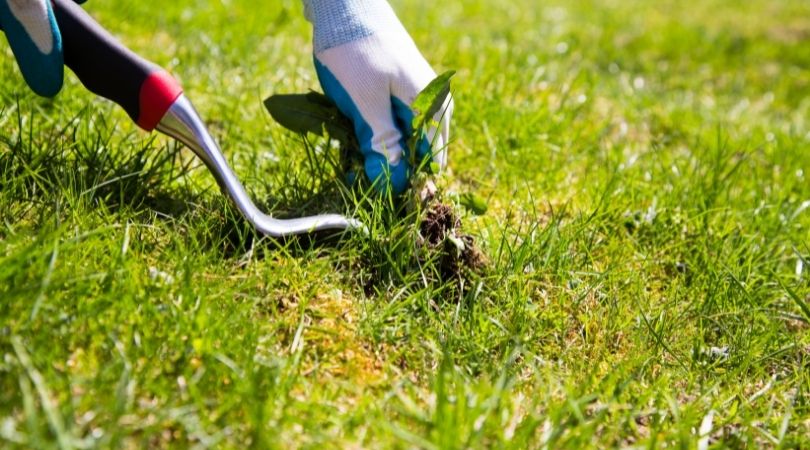
Just the fact that you have a lawn, means you live relatively close to nature. And if you do, you surely don’t want to do her any harm, right? We so often just grab for whatever commercial product is most widely and effectively advertised, that we forget the quiet joys that come from concocting a gardening solution ourselves and watching it solve our problem.
Always remember, your grass is one part of a bigger ecosystem that is your garden. Don’t only try to solve the weeds on your lawn. It will never work well. But treat the whole ecosystem, and you’ll see magic.
Some of the concoctions I described will inevitably work better than others, but all of them will show you how to get rid of weeds without killing grass.

